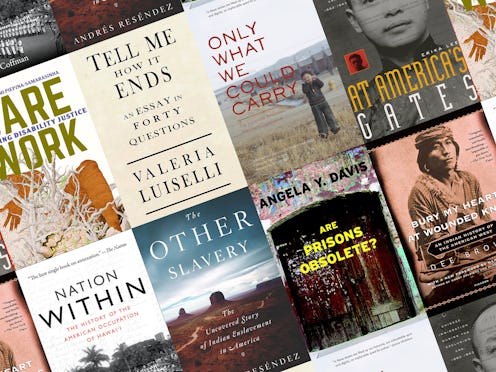Books
10 Books That Contradict The Idea Of America Being “The Land Of The Free”

Many people view Independence Day as a time for gathering and celebrating the freedoms provided by living in the U.S. Not everyone in this country is able or allowed to exercise those freedoms, however. For your reading pleasure this July 4, I've picked out 10 books about American history and politics that complicate the idea of "independence," because for a country that claims to be all about freedom, we certainly make sure that only the "right" kinds of people have access to life, liberty, and the pursuit of happiness.
The United States has the highest prison population per capita, and the statistics on who goes to prison show that the criminal justice system is intrinsically racist. Although only 13 percent of the U.S. population is black, a whopping 40 percent of the U.S. prison population is black, and more than 2,200 out of every 100,000 black people are imprisoned each year.
In addition to locking up U.S. citizens of color, the country also separates Hispanic and Latinx immigrant children from their families, and detains them in horrific living conditions, which many have compared to Nazi concentration camps. That's not taking into account the system of Japanese-American internment that detained and disenfranchised 120,000 citizens during World War II, claiming their homes and businesses in the name of... well, we still aren't sure about that.
Did I mention the fact that disabled people often have to give up basic rights and forgo working in order to afford housing? Or that the U.S. government destabilized and took over sovereign nations in order to monopolize fruit trade? Seriously, folks, I can't make this stuff up.
The U.S. might claim it's a place of freedom, but not everyone here is free. Not even close. Here are 10 books you should read if you want to dig into the realities of American "independence."
'Tell Me How It Ends: An Essay in Forty Questions' by Valeria Luiselli
Based on the author's time working as a translator for children detained at the U.S.-Mexico border, Valeria Luiselli's Tell Me How It Ends is a powerful essay about the brutal experiences of undocumented minors.
'The Half Has Never Been Told: Slavery and the Making of American Capitalism' by Edward E. Baptist
In this lengthy, award-winning work, Edward E. Baptist examines how the growth of slavery in the post-Revolutionary South corresponded with and contributed to the nation's rise as a capitalist power — one that was built almost exclusively using slave labor.
'Care Work: Dreaming Disability Justice' by Leah Lakshmi Piepzna-Samarasinha
Among the books by Tonguebreaker author Leah Lakshmi Piepzna-Samarasinha is this treatise on the hopes and realities of the disability-rights movement, which moves between personal essays and microhistories of disability in the United States.
'The Other Slavery: The Uncovered Story of Indian Enslavement in America' by Andrés Reséndez
Moving from the immediate aftermath of Columbus' voyage to the Americas to the 19th-century American West, Andrés Reséndez's The Other Slavery examines the ways in which Native Americans were forced into slavery by colonists in Europe and in their homeland for centuries.
'Only What We Could Carry: The Japanese American Internment Experience' by Lawson Fusao Inada, Patricia Wakida, and William Hohri
An anthology of artwork, photographs, and writings from Japanese-American internees, Only What We Could Carry is a one-of-a-kind book that provides an unflinching look at how immigrants and their descendants were persecuted in mid-century America.
'No Right to Be Idle: The Invention of Disability, 1840s–1930s' by Sarah F. Rose
Prior to the mid-19th century, disabled individuals contributed in their homes and communities in roles suited to their capabilities. As work moved outside the home, however, the new, transformed workplace left the physically and intellectually disabled without employment, systematically consigning them to lives of poverty — a trend that continues today.
'Nation Within: The History of the American Occupation of Hawai'i' by Tom Coffman
In the late 19th century, the U.S. annexed Hawai'i — then an independent kingdom under the leadership of Queen Lili'uokalani — through a combined effort backed by missionary groups and white agricultural leaders. Read about how the U.S. seized control of a sovereign state in Tom Coffman's Nation Within.
'At America's Gates: Chinese Immigration During the Exclusion Era, 1882-1943' by Erika Lee
After building the transcontinental railroad system under life-threatening conditions, people of Chinese ancestry were legally barred from becoming U.S. citizens, thanks to the Chinese Exclusion Act of 1882. In At America's Gates, Erika Lee explains how the act affected the course of U.S. history.
'Bury My Heart at Wounded Knee: An Indian History of the American West' by Dee Brown and Hampton Sides
Exploring 30 years of Native American history, Dee Brown's Bury My Heart at Wounded Knee examines the systematic destruction of indigenous sovereignty in the U.S., which took place between 1860 and 1890.
'Are Prisons Obsolete?' by Angela Y. Davis
Once you start to analyze the U.S.'s ridiculously high prison population, you begin to wonder just how much overhaul the criminal justice system needs. In Are Prisons Obsolete?, Angela Y. Davis argues that we don't really need incarceration facilities at all, and lays out a vision of a world without prisons.
This article was originally published on